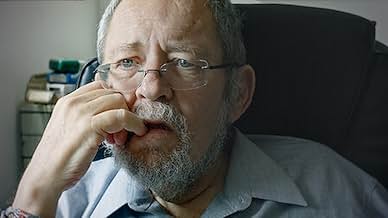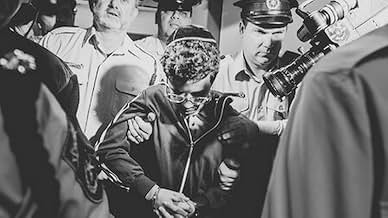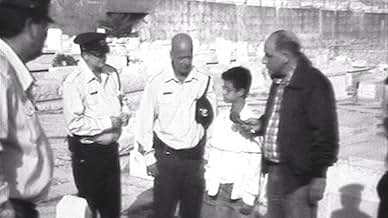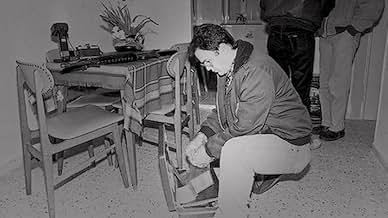AVALIAÇÃO DA IMDb
5,3/10
1,9 mil
SUA AVALIAÇÃO
Adicionar um enredo no seu idiomaIn Jerusalem 1986, a 14-year-old boy shoots his family point-blank in their beds. Yet questions persist. In this docuseries, insiders come forward.In Jerusalem 1986, a 14-year-old boy shoots his family point-blank in their beds. Yet questions persist. In this docuseries, insiders come forward.In Jerusalem 1986, a 14-year-old boy shoots his family point-blank in their beds. Yet questions persist. In this docuseries, insiders come forward.
Explorar episódios
Avaliações em destaque
A potentially fascinating case, but production levels that look like they came from someone's back shed, and a line of enquiry that goes nowhere and asks nothing, results in a lot of air and gossamer, and nothing else.
A wild story, no doubt. If it had just stuck to facts that would have been one thing. But they tried to be investigative, but didn't get a single thing out of anyone. Good use of archival footage, but could have been shorter, the defense attorney said nothing useful and instead wasted our time and the documenters'.
The premise of "The Motive" is intriguing enough to warrant a documentary. A fourteen year old boy kills his parents and two sisters, shows no remorse and never provides a justification. The 'no remorse' aspect can be attributed to a mental disorder. However the roughly two hours of episodes never provides an answer as to why he did it. The frustrating attitude of defense lawyer Yossi Arnon of "I know but I'll never tell" just gets played out for far too long. And having to watch close up shots of his old man gecko-like tongue flicking in and out of his mouth was unpleasant. Watching four episodes and never hearing the name of the central figure was confusing at first. I had to search online for why that was. The identity of minors must has been protected by law in Israel. That's fine but it's never mentioned in the docu-series. So you are left wondering why his name is never mentioned and yet he's shown throughout in news footage and home movies. Only until the end credits roll do you realize that it was all re-enactments. Re-enactments in documentaries are now common place but they usually are so stylized that you know what they are without needing to be told. But with 'The Motive' I felt very confused as to what was real and what was a re-enactment. I can only be sure that the interviews were real.
The biggest issue I have with this docuseries is the interview process - or at least what's visible to us. The questions are closed-ended or loaded with preconceptions or not provocative enough. It's like just seeking confirmation for whatever the interviewees had planned to say. A good interviewer should be both provocative and able to put people at ease so that interviewees would reveal more of what they're thinking/feeling (there are a few brief moments in which they managed to do that, but the rest of the interview is just a disappointment).
Also, they should always press for something more concrete from the interviewees, especially those considered to be experts or authorities - there's a lot of flowery language and swelling emotions, but not much substance. Like the lawyer who thinks he knew the motive, sure, but maybe wonder why his opinion holds any weight as he's not a psychiatrist? Or how he drew his conclusions? Or the psychiatrist, who admitted we have better understanding of mental states now than before, sure, what are the developments? What are the studies, terminologies, examples, etc? What are the philosophies on children crimes, mental health, family dynamics, military, gun control, Israeli state at that time, etc?
For me, there are two possible reasons why he could've committed such heinous crimes - one influenced by external forces, and the other internal. External forces could be: abuses sustained by him or any of his family members (little evidence of that), delirium caused by rage or any extreme emotion (not found), or brain tumours (for example, see Charles Whitman; even though this is internal of the murderer, it's out of his control, hence can be considered as external, this isn't mentioned in the show).
Then, there are the potential internal forces: narcissism, psychopathy, etc. One might find it hard to imagine, but you're never in the head of a psychopath, the problem isn't that they think about doing evil things all the time, it's that evil deeds don't bother them because they're not emotionally affected by it. And one always seeks for outward traits of devil (as suggested by many authorities in the show), as if there's a stereotypical face caused by psychopathy. What are you looking for, a "666" tattoo? For instance, Chris Watts, who murdered his wife and daughters simply because he wanted to leave them behind and start a new life with another woman, he could also be thought as just a regular Joe. You would think the means are way too extreme for the ends, but that's not how they see it. One of my theories is that the murderer actually felt suffocated by the attention and affection that he's showered with, and could be feeling like everyone's baby, which he despised (the journalist - if she could be trusted - mentioned something along the lines that he felt that he could only be a real grown up without his family).
Lastly, there are the technical parts... first, why is it cut into 4 short episodes? Is it necessary? Or it makes the blatant repetitions of images and sentiments less egregious? Then the narrative, music... are all quite hackneyed. They aren't bad, just a little pedestrian for such a compelling story. The show seems like just a cool presentation of what people can already guess/know, they should ask more probing questions, shine light on more perspectives (with real studies to back it up). As it stands, it seems more like a he-said-she-said gossip story.
Also, they should always press for something more concrete from the interviewees, especially those considered to be experts or authorities - there's a lot of flowery language and swelling emotions, but not much substance. Like the lawyer who thinks he knew the motive, sure, but maybe wonder why his opinion holds any weight as he's not a psychiatrist? Or how he drew his conclusions? Or the psychiatrist, who admitted we have better understanding of mental states now than before, sure, what are the developments? What are the studies, terminologies, examples, etc? What are the philosophies on children crimes, mental health, family dynamics, military, gun control, Israeli state at that time, etc?
For me, there are two possible reasons why he could've committed such heinous crimes - one influenced by external forces, and the other internal. External forces could be: abuses sustained by him or any of his family members (little evidence of that), delirium caused by rage or any extreme emotion (not found), or brain tumours (for example, see Charles Whitman; even though this is internal of the murderer, it's out of his control, hence can be considered as external, this isn't mentioned in the show).
Then, there are the potential internal forces: narcissism, psychopathy, etc. One might find it hard to imagine, but you're never in the head of a psychopath, the problem isn't that they think about doing evil things all the time, it's that evil deeds don't bother them because they're not emotionally affected by it. And one always seeks for outward traits of devil (as suggested by many authorities in the show), as if there's a stereotypical face caused by psychopathy. What are you looking for, a "666" tattoo? For instance, Chris Watts, who murdered his wife and daughters simply because he wanted to leave them behind and start a new life with another woman, he could also be thought as just a regular Joe. You would think the means are way too extreme for the ends, but that's not how they see it. One of my theories is that the murderer actually felt suffocated by the attention and affection that he's showered with, and could be feeling like everyone's baby, which he despised (the journalist - if she could be trusted - mentioned something along the lines that he felt that he could only be a real grown up without his family).
Lastly, there are the technical parts... first, why is it cut into 4 short episodes? Is it necessary? Or it makes the blatant repetitions of images and sentiments less egregious? Then the narrative, music... are all quite hackneyed. They aren't bad, just a little pedestrian for such a compelling story. The show seems like just a cool presentation of what people can already guess/know, they should ask more probing questions, shine light on more perspectives (with real studies to back it up). As it stands, it seems more like a he-said-she-said gossip story.
Kept showing the same scenes over and over again , and to this day no one knows the motive. A horrific crime like the one committed should have been far more compelling, instead it became boring .
Principais escolhas
Faça login para avaliar e ver a lista de recomendações personalizadas
- How many seasons does The Motive have?Fornecido pela Alexa
Detalhes
- Data de lançamento
- País de origem
- Central de atendimento oficial
- Idioma
- Também conhecido como
- The Motive
- Empresa de produção
- Consulte mais créditos da empresa na IMDbPro
- Tempo de duração
- 35 min
- Cor
Contribua para esta página
Sugerir uma alteração ou adicionar conteúdo ausente


































